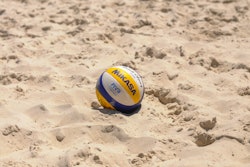![[Photo courtesy of USA Pickleball]](https://img.athleticbusiness.com/files/base/abmedia/all/image/2021/10/Newport_Beach_Tyson_McGuffin.617953cb8c002.png?auto=format%2Ccompress&q=70&rect=0%2C195%2C1920%2C1080&w=400)
“What is that noise?”
Working the front lines of a community center in Destin, Fla., Karen Parrish, familiar with the crack of a bat after 40 years as a competitive softball player and three more in women’s pro baseball, couldn’t quite identify the smack of wooden paddle against plastic ball that she was hearing from the back of the facility’s gymnasium.
“I went back there and some of our snowbirds who had come into town from Canada had set up a net and were showing some other people how to play,” Parrish says of her visual and auditory introduction to pickleball. “And I was like, ‘Oh, that looks like fun. Let me see if I can do it.’ Right away I was hooked.”
Parrish quickly became a pickleball enthusiast, then a USA Pickleball ambassador and regional director before being hired to a paid position by the governing body in 2019 as its managing director of competition.
While perfection is the thief of joy, failing to flag tournament troubles ahead of time can be the thief of success. Whether in the real-world physical space of a sport like pickleball, or in a cloud-based competition like esports, industry experts offer tips on how to throw an organized, approved and network-connected tournament.
Benefits of sanctioning
Before the exciting echoes of paddle-thwaps on tournament day, there are some T’s to cross and I’s to dot, says Parrish, who oversees rules, ratings, equipment standards, sanctioning guidelines and national tournaments for USA Pickleball.
One element emphasized by sports-governing bodies like USA Pickleball is getting your event sanctioned. Sanctioning offers legitimacy and organization to the tournament. Getting an event sanctioned typically requires a fee, but through most organizations, you get something for it.
“Here’s the most important thing: By sanctioning your tournament, you have general liability insurance for your tournament director, your staff, your volunteers,” Parrish says. “And then we have secondary accident insurance, which covers your USA Pickleball members: your participants who are playing in your tournament. Now what does that mean? That means if I’m playing in the tournament, and I don’t have insurance and I get hurt, the insurance policy will cover me. And that’s very important to know, because I’ve been to tournaments where it wasn’t sanctioned, they didn’t have insurance, and you see people get hurt and they’re out thousands of dollars. So, it’s very important that you want to make sure you’re covered.”
Depending on your sport of choice, groups like the United States Tennis Association, US Club Soccer and USA Ultimate offer information about sanctioning through their websites.
Location, location, location
Another consideration for tournament planning is the locale: outdoors or indoors, or both, plus how much space is needed. “One of the things that we talk to people about is: A lot of the tournaments you see are outdoors,” Parrish explains. “If you’re in an area that rains, you want to make sure that you have some sort of indoor backup. You would hate for the players to pay all of this money to come to your tournament, and they can’t even play, and then you don’t offer a refund. Some people offer weather insurance, meaning they bought some type of insurance policy, so if they do get rained out, there’s some sort of recourse to getting some funds back.”
You also want to make sure your tournament venue is big enough to host the competitors. For pickleball, for instance, you can’t plan to host 400 people at a six-court facility, so scale your tournament site and participant field accordingly. Your venue should have enough lights and enough bathrooms, too.
Parrish also suggests that tournament directors work with local businesses that can come in and help sponsor the tournament, or provide prizes in a raffle. Local sponsors bring awareness to area businesses and the community, plus it shows larger support for the tournament.
Don’t forget the Wi-Fi
A contemporary blunder to avoid: neglecting your event’s Wi-Fi needs.
“One of the biggest things that you really don’t think about is Wi-Fi,” Parrish says, particularly if tournament management software is in play. “In order for the software to be used, you have to have enough bandwidth, and you have to have a great Wi-Fi connection, or the software doesn’t work.”
If you haven’t planned ahead for wireless connection needs, your tournament could come to a halt. “Then you’re stuck and you can’t print out score sheets, you can’t move the brackets forward,” Parrish says. “I have seen that at tournaments where there wasn’t enough bandwidth or Wi-Fi, so people would have to get on their hotspot or something like that to move it forward.”
Wi-Fi is even more important when the tournament you’re planning is for esports, says Norman Rice, chief operating officer of cloud-driven networking company Extreme Networks.
“Esports in particular require, frankly, almost high-frequency trading speeds,” Rice says. “So, a millisecond matters. It does. A millisecond matters if you’re competing, especially if it’s intercollegiate, and you’re in two locations that are 1,000 miles apart. That millisecond matters. And people expect it. These kids are competing and they’re playing on a central platform, and they could be next to each other or they could be miles away, but that millisecond matters because each move makes a difference.”
Having permanent Wi-Fi in a facility is one thing, but having Wi-Fi or network connectivity to support lots of people in a small area is typically a whole other step, according to Rice. “Many organizations do that temporarily,” he says. “If you’re going to host an event, a tournament, a concert or something that’s not your primary business, or it occurs in some infrequent basis where you don’t require permanent Wi-Fi, then what you would want to do is plan for temporaries.”
In that case, Rice says tournament directors should seek out service providers who will come into an event and set it up for you.
“They’ll buy from vendors like us to provide that simply,” Rice says. “In fact, here’s a great example: The NFL, when they do the Super Bowl, there’s all kinds of temporary stuff set up. All of the security apparatus, all of that’s temporary. They’ll show up and the league owns a bunch of our stuff that they set up temporarily, and we support that with them.”
Keeping it fun
Just because she’s helping pickleball lovers stay organized and safe at their tournaments doesn’t mean Parrish put down the paddle. She’s still having fun playing.
“You can use it as a recreational, fun, let’s-get-together-and-hit-the-ball-around type of thing. And then you can migrate right over to being competitive,” Parrish says. “It’s a very welcoming sport. You don’t have to have some type of athletic background. You don’t have to be a tennis player or softball player or anything like that. You just have to want to have fun. That’s it.
“If you want to have fun, come out to a pickleball court, meet some people and let’s have fun. That’s what I love about it.”





































